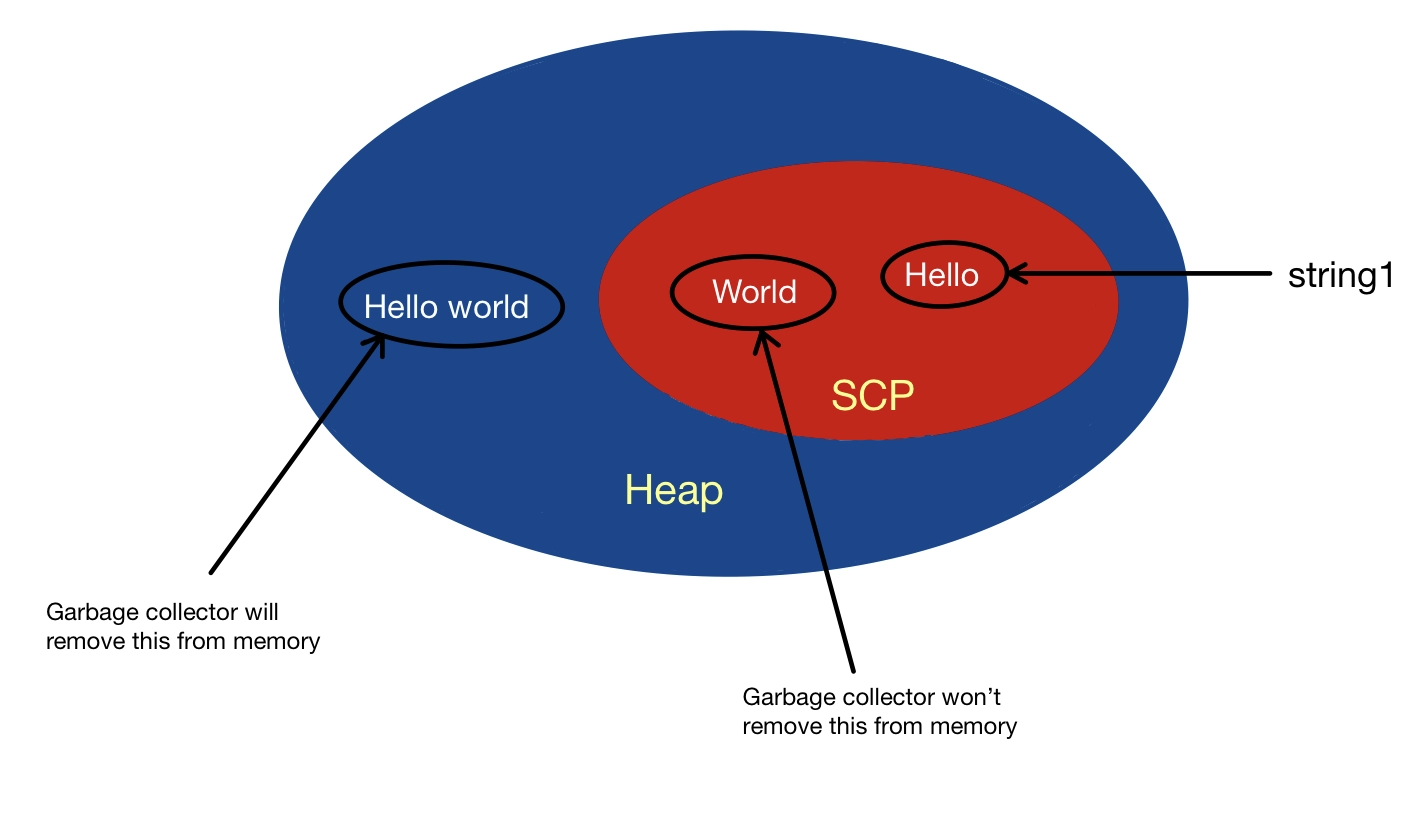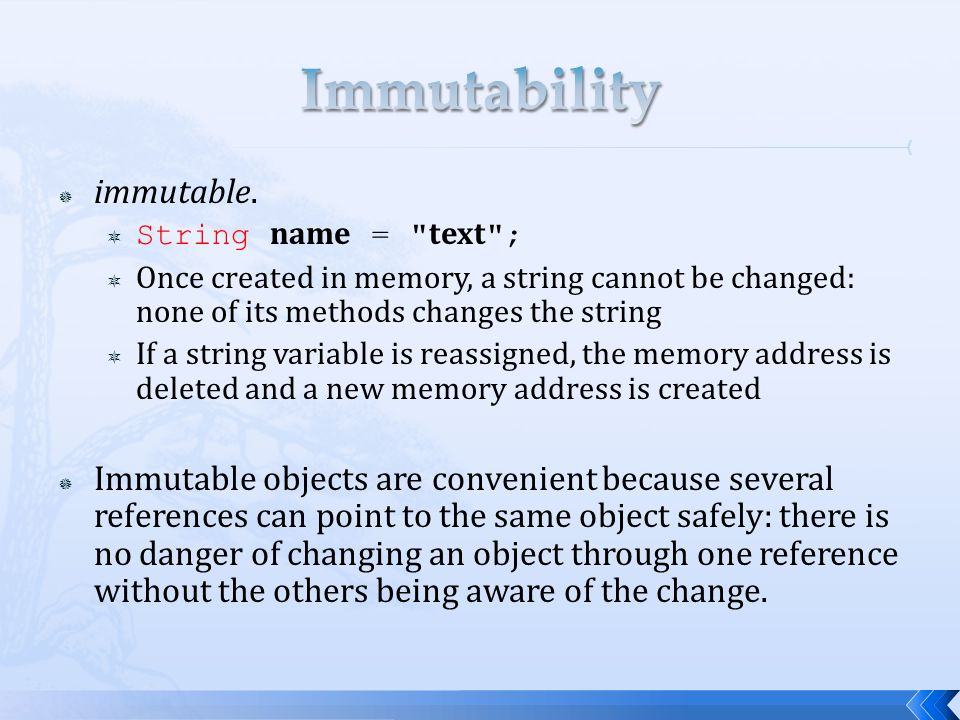Why Are Strings Immutable in Java? Enhancing Code Reliability
Wiki Article
Discovering the Advantages of Immutable Strings in Modern Programming Paradigms
In the realm of modern programs standards, the concept of immutable strings stands as a foundation of durable software growth. By taking on unalterable strings, programmers can make certain enhanced data honesty, improved thread safety, streamlined debugging procedures, enhanced security steps, and efficient performance optimization.Improved Data Integrity

By preventing the modification of string things, immutability removes the threat of unintentional adjustments to the information they hold. This not just boosts the security of the information yet also enhances the reliability of the code that counts on these strings.
Immutability likewise sustains more secure multithreading environments, as concurrent access to immutable strings does not posture the risk of data corruption via simultaneous alterations. This residential property simplifies the process of taking care of strings in parallel programs circumstances.
Essentially, immutability serves as a safety shield around the data kept within strings, improving their stability by guaranteeing that as soon as defined, their worths remain the same throughout the program's implementation.

Improved Thread Safety
Immutable strings boost the string security of programs by making certain that once a string object is developed, its worth can not be customized. This residential property removes the threat of simultaneous strings trying to change the same string simultaneously, which might bring about data corruption or irregular states in the program - Why are strings immutable in Java?. In a multi-threaded setting, where multiple threads gain access to and control data at the same time, the immutability of strings offers a level of safety by guaranteeing that the information stays unchanged throughout its lifecycleSimplified Debugging Procedures
Offered the boosted thread safety and security promoted by unalterable strings, a significant advantage emerges in the realm of streamlined debugging procedures. Immutable strings, when developed, can not be changed, making it much easier to map the flow of information and recognize the source of pests in a program. This immutability guarantees that strings stay constant throughout the implementation of the program, decreasing the chance of unanticipated changes that could cause mistakes.When debugging with mutable strings, programmers commonly experience problems where a string's worth is customized accidentally, making it challenging to determine the source of a bug. Nevertheless, with immutable strings, the information stays unchanged, allowing developers to concentrate on assessing the real reasoning of the code as opposed to tracking down where and when a string was modified inaccurately.
In addition, immutable strings simplify the debugging procedure by enabling less complicated recreation of bugs. Considering that immutable strings do not alter state, developers can recreate and examine insects better, resulting in quicker identification and resolution of issues within the codebase. This structured debugging workflow eventually adds to greater software application high quality and improved overall advancement effectiveness.

Increased Protection Procedures
Enhancing information defense and fortifying system honesty, the utilization of unalterable strings check here in software applications adds substantially to boosted security measures. Unalterable strings, once developed, can not be modified, providing an important defense against destructive meddling or unauthorized gain access to. By making sure that delicate data stored in strings continues to be unchanged throughout the program's implementation, the danger of information breaches or injection assaults is considerably lowered. Why are strings immutable in Java?. Unalterable strings additionally play a crucial duty in stopping typical security vulnerabilities such as buffer overflows and SQL injection strikes, as efforts to adjust string information at runtime are inherently restricted.Moreover, the immutability of strings boosts the predictability of program behavior, making it simpler to confirm inputs and prevent unanticipated changes that can jeopardize safety and security. This predictability streamlines the process of bookkeeping and verifying code, allowing programmers to identify possible safety and security technicalities better. In general, incorporating unalterable strings right into software program advancement techniques not just improves the robustness and integrity of applications yet additionally strengthens their strength against safety hazards.
Reliable Performance Optimization
Structure upon the foundation of boosted protection measures attained through the utilization of immutable strings, an essential facet to take into consideration in software application development is efficient efficiency optimization. When handling mutable strings, operations like concatenation or substring production often result in the creation of new string objects, leading to memory expenses and enhanced handling time. Nevertheless, with unalterable strings, these procedures can be enhanced to boost performance. By enabling strings to stay unchangeable and constant, unalterable strings assist in much better memory management and caching possibilities, inevitably increasing the general performance of the software.
Immutable strings likewise play a critical duty in multithreaded settings by promoting string safety and security. Why are strings immutable in Java?. Given that unalterable strings can not be customized as soon as developed, they can be shared throughout threads without the threat of unforeseen adjustments, minimizing the need for synchronization systems and improving concurrency. In addition, immutable strings simplify debugging procedures as designers can rely on that a string's worth will stay constant throughout the program's implementation, getting rid of potential errors created by mutable state adjustments. In verdict, using unalterable strings not only boosts security but also significantly adds to the reliable performance optimization of contemporary software application systems.
Final Thought
Finally, the benefits of utilizing immutable strings in modern programming standards can not be overstated. Enhanced information honesty, boosted thread safety and security, simplified debugging procedures, raised safety and security actions, and Going Here effective efficiency optimization all add to the general efficiency of programming tasks. By incorporating unalterable strings right into programs practices, designers can gain from a more trustworthy and robust codebase.Immutability, a crucial function of strings in shows languages such as Java and Python, ensures that when a string things is produced, it can not be altered or customized.Unalterable strings enhance the string safety of programs by making certain that once a string object is created, its worth can not be changed. Immutable strings also play a vital function in avoiding usual security susceptabilities such as buffer overflows and SQL shot he said attacks, as attempts to adjust string data at runtime are naturally limited.
By permitting strings to continue to be continuous and unchangeable, unalterable strings assist in far better memory administration and caching possibilities, eventually boosting the overall effectiveness of the software application.
Unalterable strings streamline debugging procedures as designers can rely on that a string's worth will stay constant throughout the program's execution, getting rid of possible mistakes created by mutable state modifications.
Report this wiki page